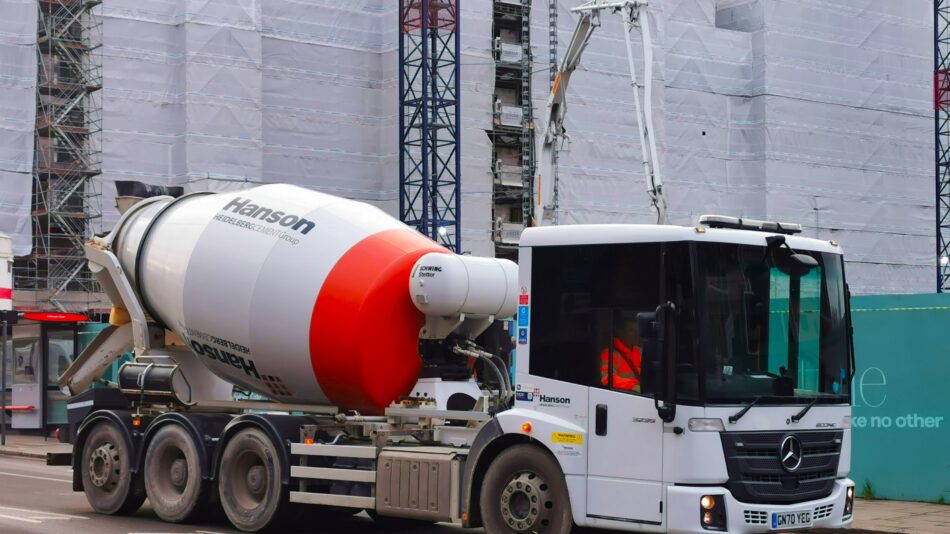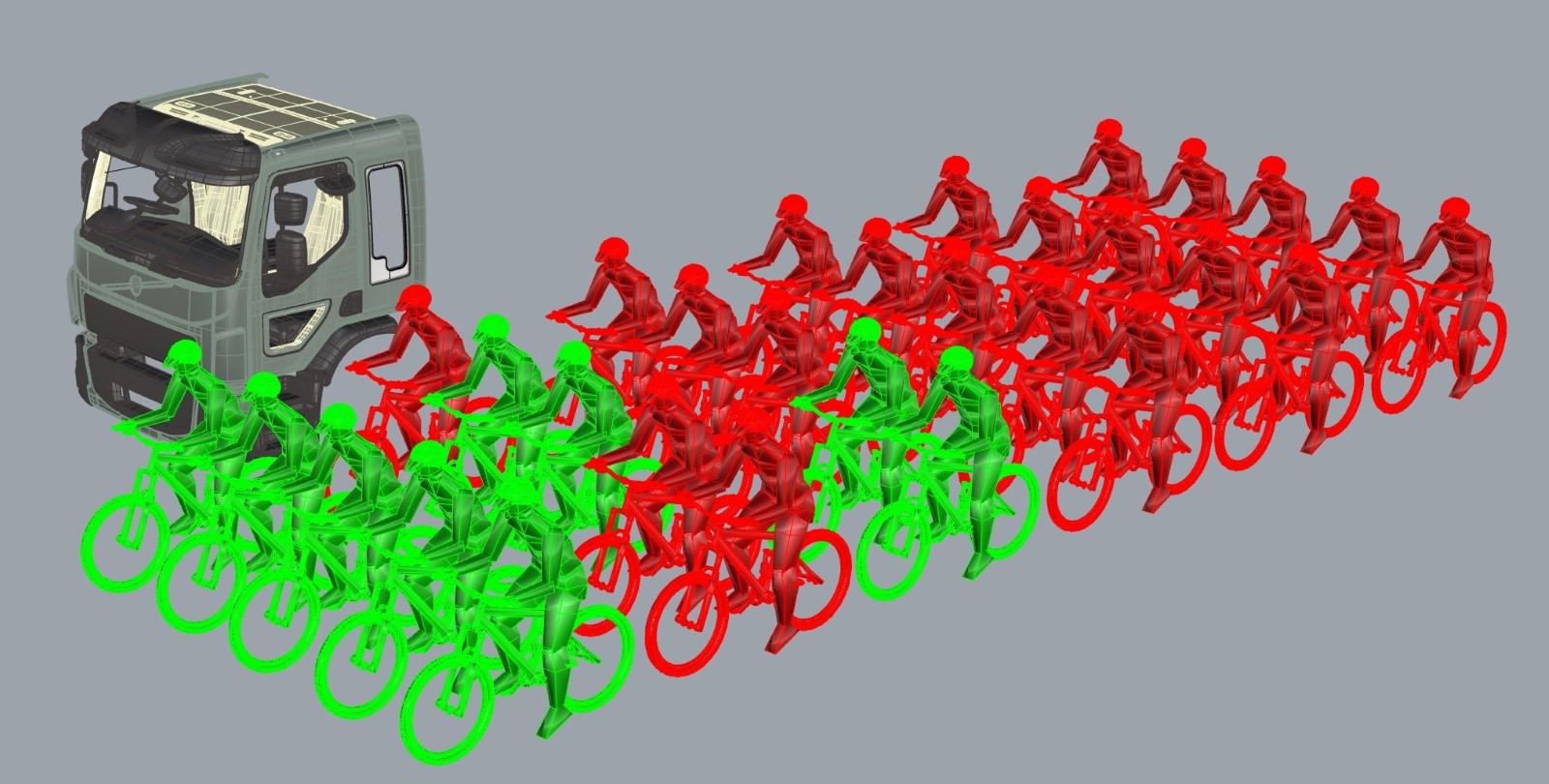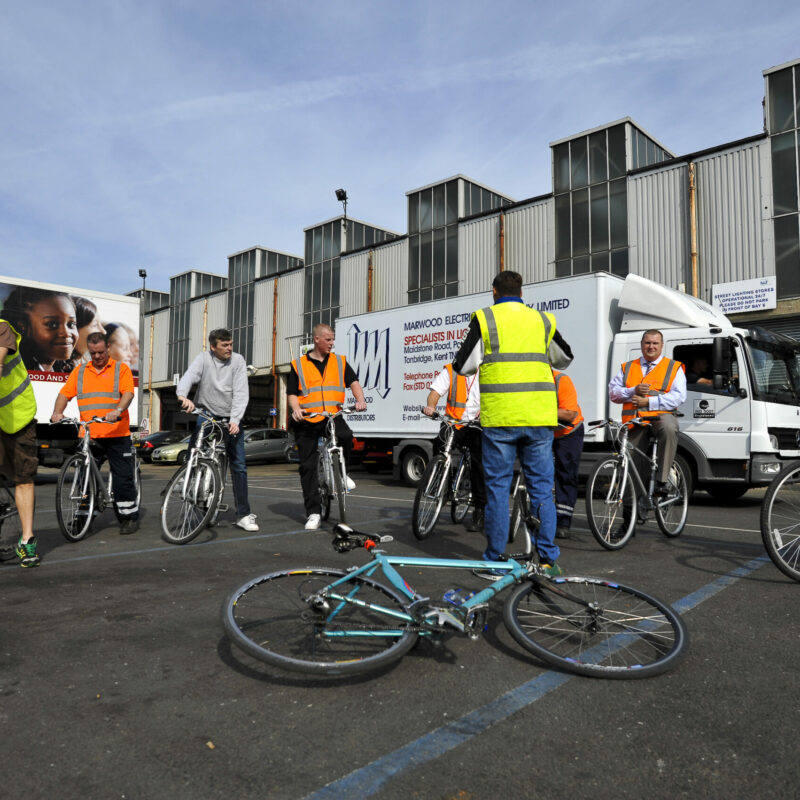

Lorries that don’t meet the standard (those with much larger ‘blind spots’) will have to have upgraded cameras and alert systems to improve driver awareness of pedestrians and cyclists near their vehicles. TfL is currently consulting on the detailed measures.
TfL has also released data on the first (one star) stage of the Direct Vision Standard saying that their data “shows that fatal collisions involving HGVs where vision is cited as a contributing factor halved from 12 in 2018, the year before the scheme was introduced, to six in 2021.”
We look forward to a capital where no urban lorry has significant blind spots that are the outcome of outdated vehicle design.

Image: a lorry with two star direct vision without camera monitoring systems. Only the green cyclists can be seen from the door window and mirrors. With cameras, all the cyclists can be seen.

A win for LCC and all Londoners
LCC’s campaigning led to Mayor Sadiq Khan making a commitment to LCC and Londoners “to get the most dangerous lorries off our streets” in 2016. That led to the introduction of a world’s first Direct Vision Standard lorry permit scheme in 2021.
TfL is consulting on an upgrade to the Direct Vision Standard requirement for HGVs, that mandates a further reduction in blind spots for vehicles working in the capital – with the upgrade due in 2024. This is a direct outcome of our earlier campaign.
LCC welcomes the progress from one-star Direct Vision Standard being the minimum for all HGV over 12 tonnes in 2021, to three stars in October 2024. We also think TfL’s new proposal to raise the standard of ‘mitigation measures,’ (that must be fitted to all lorries entering London that fail to meet the three-star standard) is essential to reduce road risk from HGVs that don’t have adequate driver vision.
Please respond to the consultation supporting the upgrade to three stars (an existing Mayoral commitment) and the proposed ‘progressive safety system.’ This is particularly important for businesses and contractors with connections to the construction industry. More details on how you can support safer lorries in your borough below.
In terms of their involvement in fatal collisions, HGVs are the most dangerous vehicles on the road. Half of cyclist fatalities and one in five pedestrian fatalities involve a lorry even though lorries only account for four percent of vehicle mileage in London. Aside from the size and weight of the vehicles, drivers have identified their ‘blind spots’ as a cause of collisions.
LCC’s response to this problem was to re-design the typical construction lorry to resemble a refuse cart with a lower cab and large all-round windscreens. We’ve campaigned to make such vehicles, now made by most manufacturers, the standard in cities, and the TfL Direct Vision Standard, which rates the driver’s direct vision (not via mirrors) on a scale of one to five, is enabling London to promote, and enforce, the use of the safer lorries. (Direct Vision has also been so popular among policy-makers, again thanks in part to LCC campaigning, it’s also moving forward across Europe – see below.)
Currently, about half the near 200,000 lorries working in London meet the one-star standard introduced in 2021. TfL data indicates that lorries below that standard (zero-rated but with ‘safe-system’ measures including a camera and alert system installed) are over-represented in fatal collisions so there is clearly more to be done.
Raising the bar to three-star Direct Vision Standard in 2024 will mean that not only zero-rated lorries but also those rated one and two star, will need to install ‘progressive safe system measures’ to receive permits to work in London (191,000 currently issued). As forecast when the Direct Vision Standard regulations first came into force, TfL has reviewed the so-called mitigation measures to strengthen them and ensure that drivers are better equipped to avoid collisions.
What TfL proposes is building-up the rules governing what cameras and alert systems HGV operators have to install in vehicles that don’t meet the three-star standard (currently the majority of London HGVs). The changes include:

Image: With Moving Off Information Systems sensors, someone standing or walking in any of the locations shown would cause an alert. Without sensors, the red people would not be visible to the driver of a standard lorry.
While all the proposed changes are valuable, innovation, new technology and training could further reduce the risk of collision. LCC will continue to press for these to be adopted by fleet operators.
Alongside campaigning for safer lorries in London, LCC sought to make all lorries have better direct vision by pressing for changes in European regulations for manufacturers. With support from both Mayors Boris Johnson and Sadiq Khan, the regulations were changed in 2018 and now specify that all new models made in the EU (lorries made in the UK already meet high DVS standards) will have to meet a direct vision standard as of 2026 and all lorries will have to meet the same standard as of 2029.
The details of the standard are still being hammered out but the choice, and affordability (3 to 5 star lorries are currently made in smaller numbers and cost more) of safer lorries is certain to improve once the regulations come into force.
As well as backing Direct Vision standards LCC has worked hard to disseminate two key work-related road risk standards the Fleet Operators Recognition Scheme (FORS) and the Construction Logistics and Community Safety (CLOCS) standard.
LCC has just become a founding Strategic Partner of the CLOCS standard alongside RoadPeace, See me Save me, the Considerate Constructors Scheme and TfL.
Set up in 2008, the FORS standard (graded Bronze, Silver and Gold) specifies a range of safety features that a lorry must include to qualify, plus the driver checks that have to be carried out and, at Silver grade, the training that drivers must complete. Nearly five thousand firms in the UK are FORS graded including a large proportion of London boroughs.
The CLOCS industry-led standard was a direct outcome of a report into lorry collisions following a spate of cyclist deaths, some of which were marked by LCC-organized candle-lit vigils and extensive lobbying.
The CLOCS standard, to which many leading UK firms subscribe, combines the requirements of FORS Silver grade with a range of commitments around construction sites notably planning of safer lorry routes (with fewer hazardous left turns) and employment of marshals at site entrances to ensure vehicles exit and enter without risk to people walking and cycling.
From the outset, LCC lobbied for boroughs and operators to sign up to FORS and CLOCS and raise safety standards. We continue to lobby boroughs, and publicize these standards.
A key to wider adoption is the procurement process – i.e. contract terms and planning conditions required by boroughs of firms working for the borough or on borough territory. LCC recently contributed to a TfL-led webinar for boroughs that set out how they can include the standards in their procurement and planning regulations. We want every London borough to add CLOCS and FORS to their procurement terms – it won’t be onerous for them to do so and it will likely save lives. So it’s hardly a hard ask for them to do so!
LCC has already written to your local LCC group and your local borough to ask them to commit to such a move. Check in with your local group (details here) to ask them whether they’ve had a result yet.
Keep up to date
